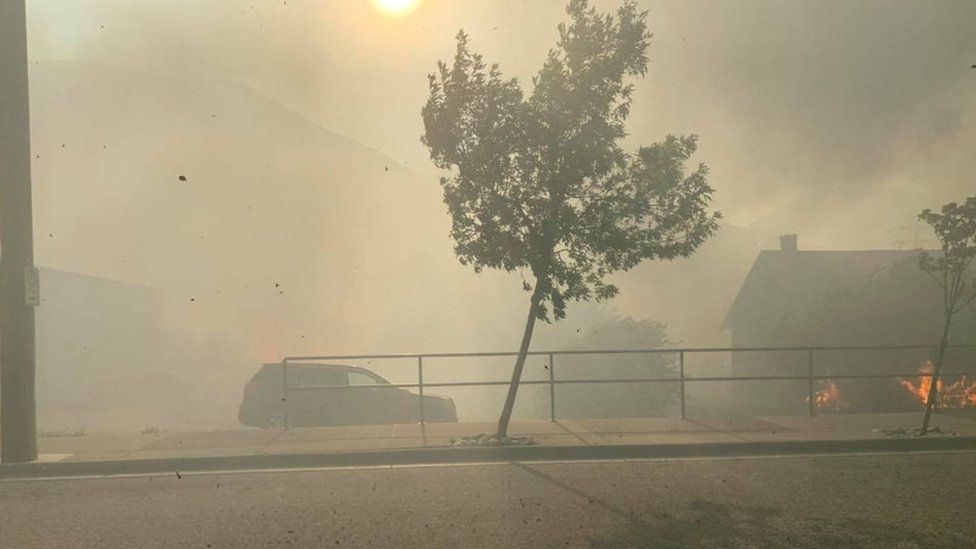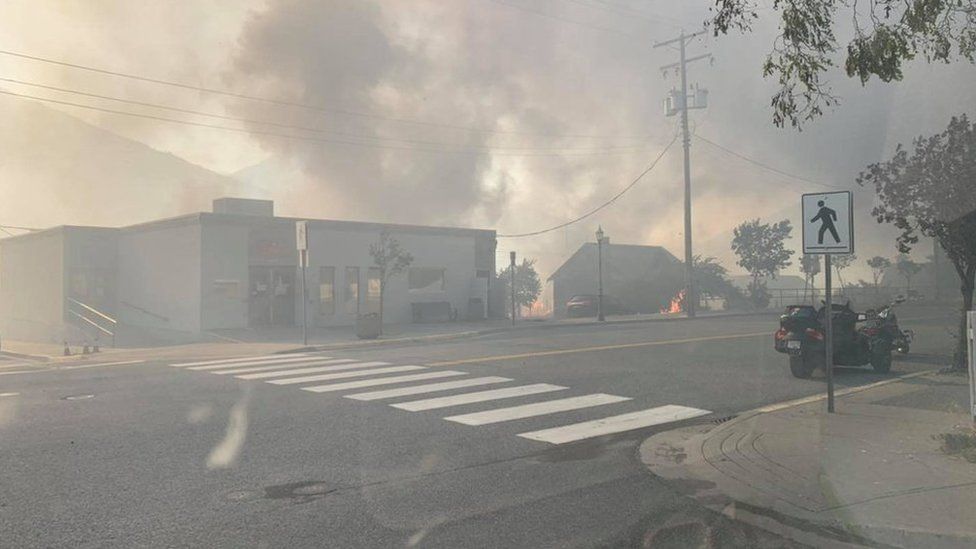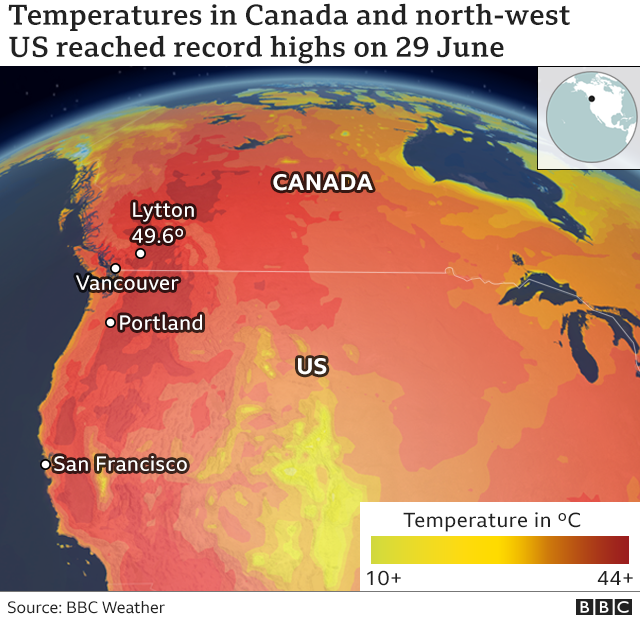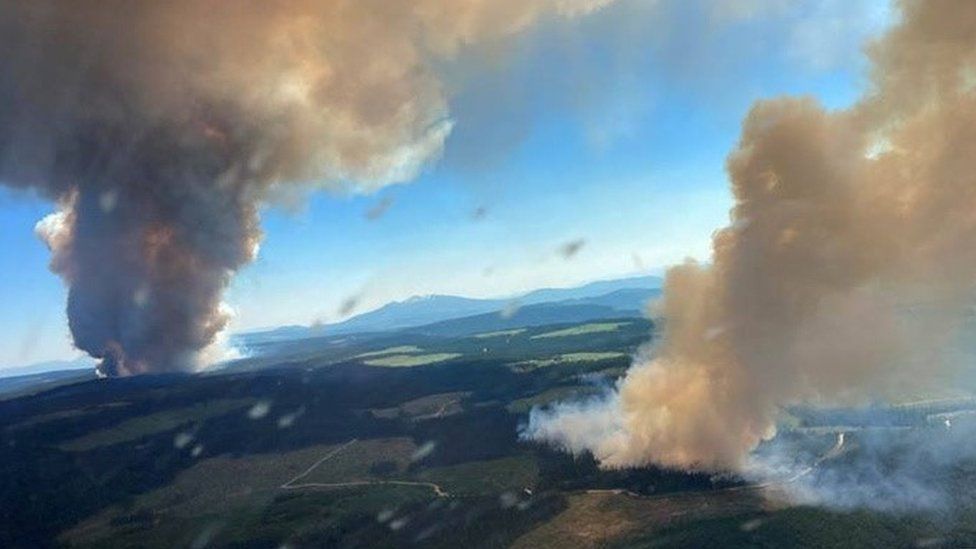Canada Lytton: Wildfire forces hottest place in heatwave to evacuate
Residents of a Canadian village which recorded the country's highest ever temperature, 49.6C (121.3F), have been forced to flee by a wildfire.
The mayor of Lytton, British Columbia, ordered people to evacuate, saying flames had spread through the village in just 15 minutes.
A heatwave has hit western Canada this week, with British Columbia recording three times its usual number of deaths.
Abnormally high temperatures have been recorded in swathes of North America.
British Columbia registered 486 deaths over five days compared with an average of 165 in normal times.
Chief Coroner Lisa Lapointe blamed the extreme weather. The western province had seen only three heat-related deaths over the past three to five years.
Many of those who died, Ms Lapointe said, had been living alone in unventilated homes.
Temperatures have been easing in coastal areas of Canada but there is not much respite for inland regions. The weather system is now moving eastwards over the Prairie provinces - Alberta and Saskatchewan and parts of Manitoba have been placed under Environment Canada heat warnings.
Climate scientists are still trying to determine to what extent climate change may have aggravated the heatwave. One scientist, Zeke Hausfather, said the unprecedented weather was almost certainly a consequence of global warming.
"Climate is sort of steroids for the weather, it's loading the dice to make these sort of extreme events be more common," he told AFP news agency.
What is happening in Lytton?
Residents fled on Wednesday, many without their belongings, as smoke and flame engulfed the village about 260km (162 miles) north-east of Vancouver.
"The whole town is on fire," Mayor Jan Polderman told CBC News after signing the evacuation order at 18:00 (01:00 GMT Thursday).
In one area, he said, "the fire was a wall about three, four feet high coming up to the fence line".
Winds of up to 71km/h (44 mph) were pushing the fire north into the community on Wednesday evening, CBC meteorologist Johanna Wagstaffe reported. Hot, dry and windy conditions in the area could mean the fire was moving at 10 or even 20km/h.
Residents were being directed to nearby communities where reception centres were being set up, while the British Columbia Wildfire Service was diverting crews and equipment from other areas to respond to the fire.
Jean McKay, who left the First Nations community of Kanaka Bar, about 15km from Lytton, with her 22-year-old daughter Deirdre, told CBC how hard emotionally it had been to leave their home.
"I cried. My daughter cried. She said, 'I don't even know why I grabbed my key. We might not even have a home.' I said, 'Yeah I know. As long as we're together we'll survive.' I just pray that our houses are OK."
"You can't even comprehend it," Lytton evacuee Edith Loring-Kuhanga told CBC Radio. "Our entire town is gone."
Before the fire, Lytton had recorded the highest temperature ever seen in Canada on three consecutive days.
How dangerous was the heat elsewhere?
In Vancouver, British Columbia's biggest city, heat is believed to have been a contributing factor in the deaths of 65 people since Friday.
The city has opened 25 air-conditioned cooling centres where people have been resting or working from their laptops.
"I have no air conditioning, only a fan at home - I came here just to work where it's cool," one woman, who gave her name only as Lou, told AFP news agency.
In the US state of Oregon, health officials tied more than 60 deaths to the extreme heat while in Washington State, 20 deaths were attributed to the weather, the Associated Press reports.
Seattle, Portland and other cities broke all-time heat records, which climbed above 46C in places.
Both Canadian Prime Minister Justin Trudeau and US President Joe Biden warned of the threat of wildfires, with Mr Biden telling governors of western US states it was as "severe as it's ever been".
Can the heat be linked to climate change?
I've heard from scientists who say that in just a few days they'll be able to determine just how much human driven warming has contributed to the searing temperatures seen in British Columbia.
One interesting piece of evidence is the lack of respite that night brings - recent temperatures at midnight in BC have been 2C warmer than the normal summer daytime figure.
Researchers say this combination of day and night-time heat is very dangerous for humans - a study published last year indicated that these compound events are closely linked to emissions of greenhouse gases.
Natural variability and local factors such as sea breezes can raise or limit the impacts of extreme heat. But the bigger picture is the rising thermometer of global heating is impacting all events.
"Every heatwave occurring today is made more likely and more intense by human-induced climate change," Dr Friederike Otto from the University of Oxford told the BBC.
"Climate change is definitely one of the drivers of the intensity of this Canadian heatwave - but it is not the only one and determining how much it impacts it, is a work in progress."
Even if they can't directly attribute this heatwave to climate change, experts say the fingerprints of global heating are all over it.








0 Comments